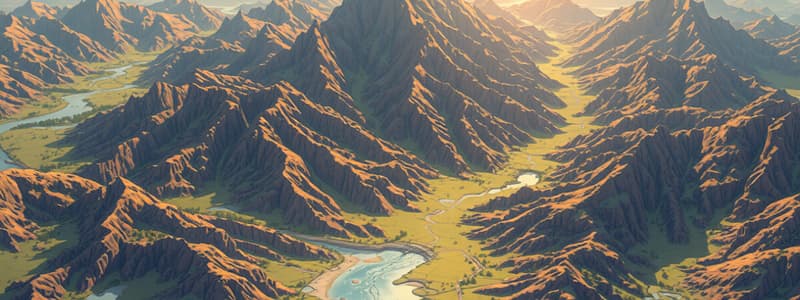Podcast
Questions and Answers
Describe the three types of density used in population geography.
Describe the three types of density used in population geography.
The three types of density are physiological, arithmetic, and agricultural density.
Explain why the densities for each country seem to vary significantly.
Explain why the densities for each country seem to vary significantly.
The densities vary because some countries have more land than others.
Describe the three main types of regimes shown on the map.
Describe the three main types of regimes shown on the map.
The three regimes are autocratic, anocracy, and democracy.
What region of the world seems to have the most autocratic regimes?
What region of the world seems to have the most autocratic regimes?
Discuss the role of social media in the Arab Spring.
Discuss the role of social media in the Arab Spring.
What are the major similarities and differences between the Hoyt's Sector Model and Harris and Ullman's Multiple Nuclei Model?
What are the major similarities and differences between the Hoyt's Sector Model and Harris and Ullman's Multiple Nuclei Model?
To what extent are the Hoyt's Sector Model and Multiple Nuclei Model useful in understanding American urban areas today?
To what extent are the Hoyt's Sector Model and Multiple Nuclei Model useful in understanding American urban areas today?
Flashcards are hidden until you start studying
Study Notes
Population Density Types
- Three types of population density: physiological, arithmetic, and agricultural.
- Physiological Density: Measures population per arable square kilometer of land.
- Arithmetic Density: Total population divided by total land area in square kilometers.
- Agricultural Density: Number of farmers per square kilometer of agricultural land.
Variations in Population Densities
- Densities vary due to differences in land area among countries.
- Example: The United States has a larger land area than Nigeria, resulting in varied densities.
- Canada has a high land mass leading to low arithmetic density despite a vast area.
- Egypt exhibits high physiological and agricultural density due to limited arable land and high farmer population relative to land.
- Low agricultural density in developed countries like the US and Canada is linked to advanced farming technologies.
Political Regimes
- Types of political regimes include autocratic, anocratic, and democratic.
- Autocratic Regime: Leader makes unilateral decisions without citizen input.
- Anocratic Regime: Hybrid system with mixed elements of autocracy and democracy.
- Democratic Regime: Citizens participate in governance by voting for officials and policies.
Autocratic Regimes by Region
- The Middle East and North Africa host the highest concentration of autocratic regimes.
Role of Social Media in Arab Spring
- Social media platforms like Facebook and Twitter played a critical role during the Arab Spring starting in 2010.
- These platforms facilitated the rapid dissemination of information about democratic revolutions.
Urban Models: Hoyt's Sector and Multiple Nuclei
- Hoyt's Sector Model: Illustrates urban development in five distinct sectors.
- Multiple Nuclei Model: Represents urban areas with nine sectors, highlighting different land uses.
- Both models identify the Central Business District (CBD) as a focal point for urban growth.
Similarities and Differences Between Urban Models
- Both models feature the CBD at the center with various residential classes nearby.
- Hoyt’s Model: Emphasizes five sectors related to transportation and socio-economic classes.
- Multiple Nuclei Model: More complex with additional sectors, includes distinctions between light and heavy manufacturing, and accounts for suburbs.
Relevance of Models to American Urban Areas
- Hoyt’s Sector Model is applicable to understanding urban expansion along transportation routes.
- Multiple Nuclei Model aligns with trends in suburbanization and emergence of multiple suburban CBDs, shifting the urban landscape away from single centralized districts.
Studying That Suits You
Use AI to generate personalized quizzes and flashcards to suit your learning preferences.




